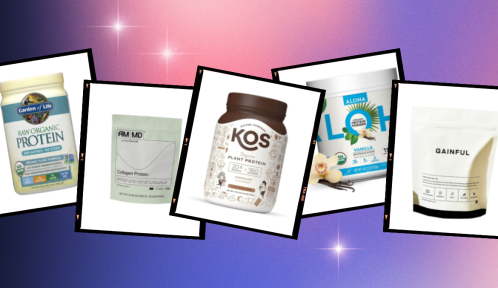Our editors independently select these products. Making a purchase through our links may earn Well+Good a commission
Protein is key to building and repairing muscle, and for those who are actively weight-lifting and looking to see “gains” will probably want to make sure they’re getting enough. Kacie Vavrek, MS, RD, LD, a registered dietitian at the Ohio State University Wexner Medical Center, says that the American College of Sports Medicine-recommended amount falls somewhere between 1.2 and 2 grams per kilogram of bodyweight. “For muscle building, athletes may need as high as 1.6 to 2.2 grams [of protein] per kilogram of body weight with strength athletes being on the higher end of this range,” says Vavrek.
Experts in This Article
registered dietitian at the Ohio State University Wexner Medical Center
registered dietitian nutritionist at RET Physical Therapy and Healthcare Group and the owner of Fuel Performance Nutrition
sports dietitian
As a weightlifter, my main goal is to build muscle, so I usually aim for a higher protein intake between 100 and 140 grams of protein; however, reaching my protein intake goal is not always feasible through my meals. After eating breakfast, lunch, and dinner, my protein intake usually sits around 80 or 90 grams of protein for the day, which is why protein drinks can help me reach my goals.
One easy way for me to ensure I’m meeting my protein intake is by consuming protein powders—which have been shown to increase physical performance and advance recovery. My only gripe with some protein powders is that they’re not flavorful enough, or taste too chalky, so I set out on a quest to find and test the best tasting protein powders on the market.
What to look for in best tasting protein powders
Beyond the amount of protein per serving—which usually ranges between 20 and 30 grams of protein per scoop—I look at the flavors and ingredients because it’s easier to consume when tasty. Common flavors include vanilla, chocolate, or strawberry, but there are fun and unique ones, too. For example, Ora Organic’s Vegan Protein Powder (now $39) takes a fun twist on vanilla with its chai infusion and is powered by fruits and vegetables like organic blueberries, apples, strawberries, broccoli, kale, and spices like turmeric. More unique flavors include Dymatize’s ISO100 Hydrolyzed Protein Powder (now $33)—one of my all-time favorites—which is flavored with a mix of natural and artificial ingredients to taste just like a bowl of Fruity Pebbles (yum).
I also look to how protein powders are manufactured, as this impacts how quickly protein is absorbed in the body: whey protein concentrate, whey protein isolate, isolate, and hydrolyzed. Whey protein concentrate is made directly from cow’s milk, has a protein concentration between 70 and 80 percent, and contains some lactose and fat, according to Roxana Ehsani, MS, RD, CSSD, LDN, a registered dietitian nutritionist and adjunct professor at Virginia Tech University. Its isolate counterpart, on the other hand, is mainly just the milk protein, containing about 90 percent protein and is absorbed faster than whey protein concentrate, says Ehsani.
Similar to whey protein isolate, isolate powders are high in protein (90 percent protein) with the bonus (for some) of being low in carbs and fat. “A lot of protein powders that you see on the market likely will be in isolate form, such as whey isolate or soy isolate,” explains Ehsani. Another type of protein is hydrolyzed protein powder—which “means that the protein has been broken into smaller chained amino acids, therefore are ultra quick to digest,” she adds. This type of protein is considered the “crème de la crème.” Why? Because this type contains smaller peptides compared to non-hydrolyzed protein that are rapidly absorbed into the gut, accelerating post-workout recovery. However, this additional step can be costly, resulting in a more expensive product.
For vegans, vegetarians, or people with dietary restrictions, plant-based protein powders are another great option. Some are made of natural ingredients and “contain a collection of amino acids that complement each other,” says Laura Simmons, MS, RDN, CD, a registered dietitian at RET Physical Therapy and Healthcare Specialists based in Washington state.
Simmons also recommends amino acids, aka the “building blocks of life.” “Leucine, isoleucine, and valine are three of the nine essential amino acids that play a particularly strong role in muscle protein synthesis (muscle growth),” explains Simmons. She adds that it is essential to obtain these amino acids throughout the day and recommends between 3 and 4 grams of leucine for maximum muscle protein synthesis.
Now that you’ve gotten a quick breakdown of different types of protein powders (although we still recommend reading our in-depth guide if you’re still unsure!), let’s get to products themselves. We tested a dozen protein powders and rounded up the best tasting ones, so you don’t have to play that old game of “Hit or Miss.” From Chips Ahoy-flavored protein powder to chocolate peanut butter, rest assured, there’s a flavor for whatever your taste buds are tickling for post-workout.
Whey protein powders
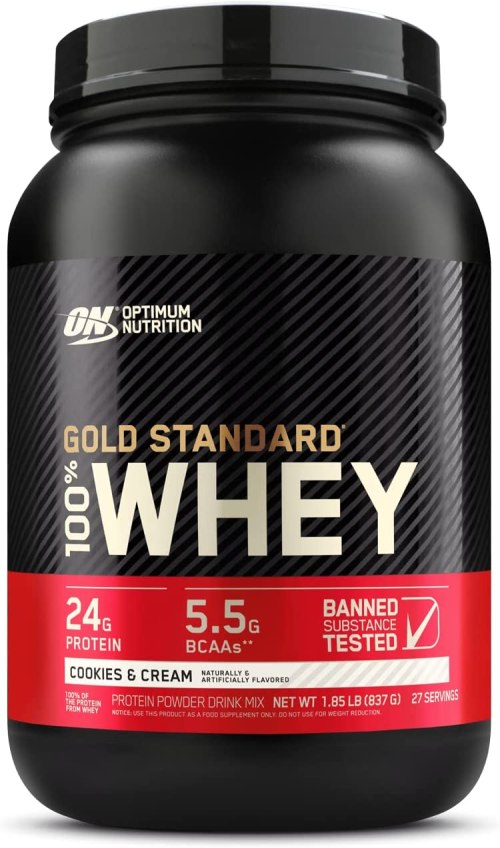
Optimum Nutrition, Cookies and Cream Protein Powder — $42.00
Protein: 24 g/serving
My favorite ice cream flavor, cookies and cream, is finally available in a powder form (yay). Made of a blend of whey protein concentrate and isolate, and crushed cookie crumbs, Optimum’s Nutrition protein powder is as nutritious as it is tasty, clocking in at 24 grams of protein and only 2 grams of sugar per serving. To bolster my gains. I add one scoop of this powder to my Blender Bottle, shake, and enjoy it after a hearty leg day. I personally love cookies and cream, but if this flavor isn’t your cup of tea, there are five other ice cream-inspired flavors to enjoy: chocolate peanut butter, milk chocolate, mocha cappuccino, strawberry and cream, and vanilla ice cream. Say it with me: I scream, you scream, we all scream for protein powder!
Cost: $1.55 per serving at the time of publication (27 servings total)
Pros:
- 24 grams of protein per serving
- Free of banned substances
- Six flavors
- Low sugar
Cons:
- Contains milk and soy
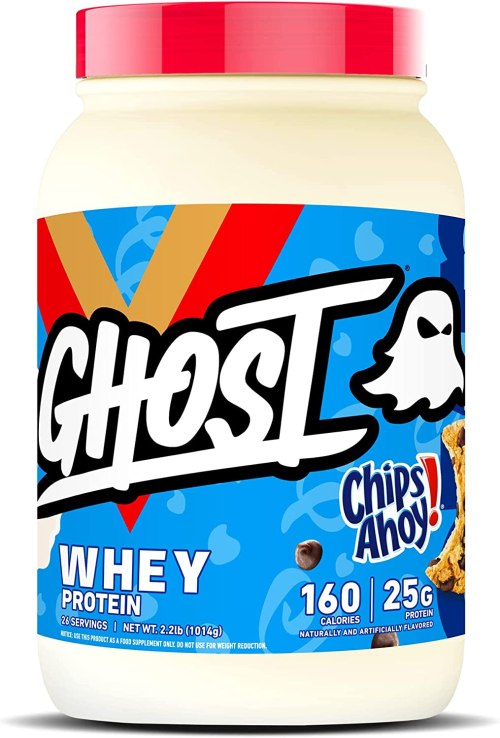
Ghost, Chips Ahoy Whey Protein — $45.00
Protein: 25 g/serving
If you’ve were ever deterred from buying a protein powder because of the flavor, I’m here to tell you that Ghost’s Whey Protein Powder won’t “boo” you away (hehe). The brand’s Chips Ahoy flavor, a customer favorite, has racked a following for its crumbly goodness. Each serving is packed with 25 grams of protein, 7 grams of carbs, and 4 grams of sugar. My favorite part are the bits of Chips Ahoy cookie pieces. It’s like enjoying a chocolate chip cookie in a sip! Also, the brand boasts nine other mouth-watering flavors like Oreo, Nutter Butter, and cinnamon cereal milk.
Cost: $1.73 per serving at the time of publication (26 servings total)
Pros:
- Contains Chips Ahoy cookie bits
- 25 grams of protein per serving
- 10 flavors
Cons:
- More sugar than protein powders on the list
Isolate protein powders
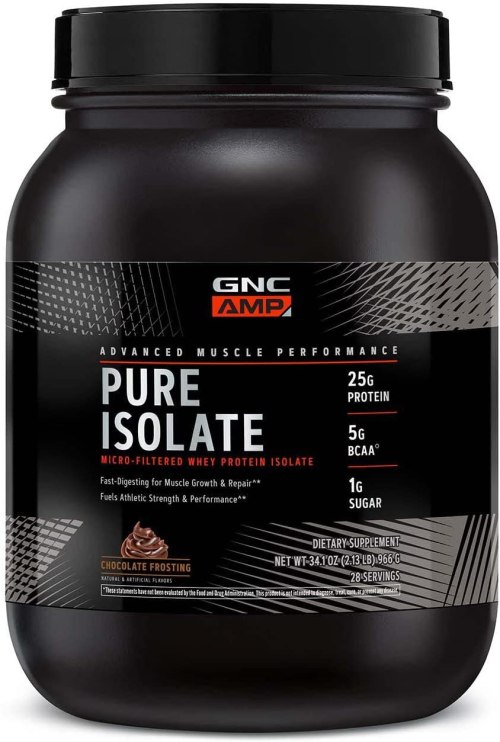
GNC, AMP Pure Isolate Chocolate Lava Cake — $65.00
Protein: 25 g/serving
This GNC isolate protein powder is one to stock in your kitchen cabinets. Featuring 25 grams of protein per serving, 5 grams of BCAAs, and only 1 gram of sugar, GNC’s Pure Isolate amps up muscle recovery and performance with each sip. Not only is the formula easy to mix, the chocolate frosting flavor—which is flavored by cocoa—adds a sweet touch to my protein shakes post-workout. Definitely “choc” this protein powder out!
Cost: $2.32 per serving at the time of publication (28 servings total)
Pros:
- 25 grams of protein per serving
- Easily digestible
- Low sugar
- Easy to mix
Cons:
- Expensive per serving
Hydrolyzed protein powders
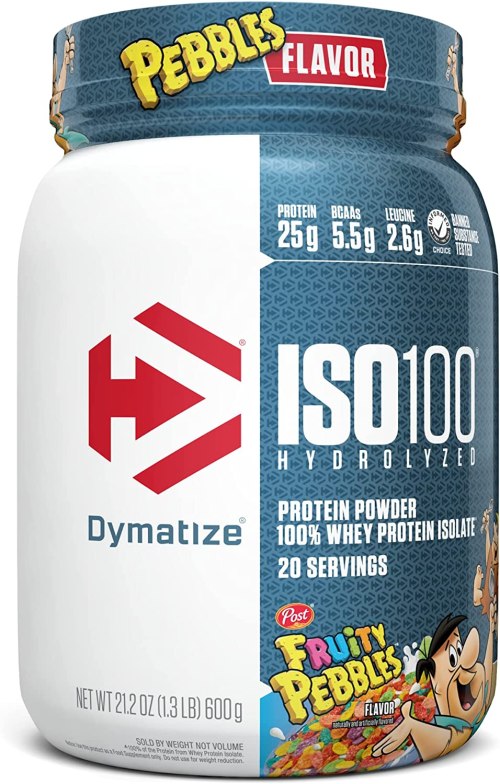
Dymatize, ISO100 Hydrolyzed Protein — $33.00
Protein: 25 g/serving
Hydrolyzed protein powders go through an extra process that renders it more digestible and aids in better absorption, and for that, Dymatize’s ISO100 Protein Powder is at the top of my list. As a kid, I lived on cereal, so the Fruity Pebbles flavor is reminiscent of my childhood. I love that this protein powder tastes just like the real thing (minus the added sugar). Plus, it has specks of bright colors and edible glitter (ooooh, shiny) in the powdered format and serves up a total of 25 grams of protein per scoop. And with just 1 gram of sugar per serving, you’ll be mind blown that this isn’t cereal.
Cost: $2.65 per serving at the time of publication (20 servings total)
Pros
- Tastes just like Fruity Pebbles
- 25 grams of protein per serving
- Hydrolyzed protein
Cons
- Expensive per serving
Plant-based protein powders
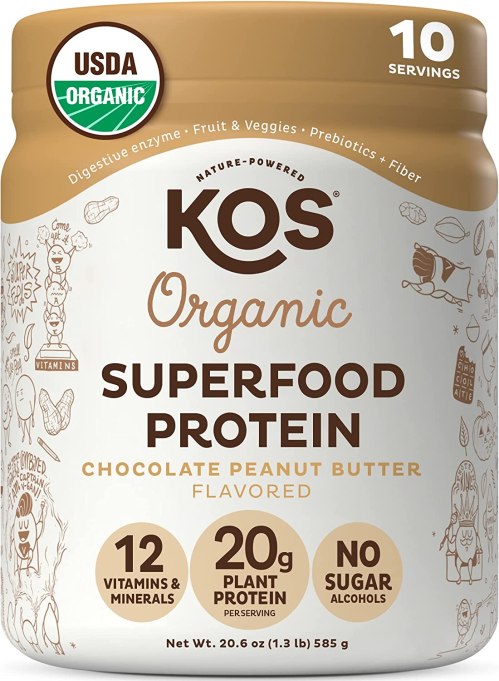
Kos, Organic Superfood Protein — $20.00
Protein: 20 g/serving
If Reese’s Peanut Butter Cups is what you crave, Kos Organic’s Protein is it’s fraternal twin. This chocolate peanut butter-flavored protein powder marries a happy balance of chocolate and nutty goodness in two scoops—which serves up 20 grams of protein. It’s all claps to the organic Peruvian cacao, organic coconut milk, Himalayan salt, and a dash of Stevia and monk fruit that add to the formula’s subtle sweetness. Not too overpowering or cloying, Kos Organic’s Vegan Protein Powder is ideal for people who only eat plant-based or want a dairy-free protein powder option. It also comes in salted caramel coffee, chocolate, and vanilla.
Cost: $2.00 per serving at the time of publication (10 servings total)
Pros:
- Infused with 12 vitamins and minerals
- 20 grams of protein per serving
- Low sugar
Cons:
- Expensive per serving
- Only 10 servings
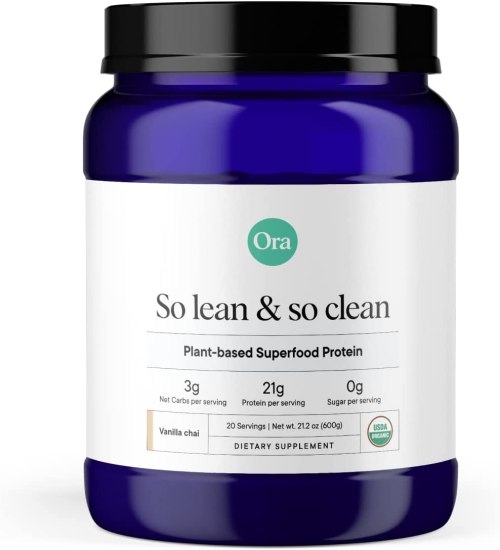
Ora, Organic Vegan Protein Powder — $39.00
Protein: 21 g/serving
Ora is another delicious plant-based option. Gluten-, dairy-, and soy-free, this vegan protein powder is friendly to people who have allergies or dietary restrictions. Crafted out of pea and rice protein, this plant-based powder packs a leafy punch with 21 grams of protein per serving (two scoops) and is loaded with superfoods and greens like blackberries, blueberries, broccoli, kale, and turmeric. One caveat to note: it was harder to mix even with a shaker, so expect to shake it up for a few minutes to blend it completely through or blend it in a blender, if that’s preferred. Offered in vanilla chai, chocolate, vanilla, and unflavored, this Ora’s protein powder has never left my taste buds hanging. I swear, you’ll also be wanting more.
Cost: $1.95 per serving at the time of publication (20 servings total)
Pros:
- Gluten-, dairy-, and soy-free
- Offered in a variety of flavors
- 21 grams of protein per serving
Cons
- Difficult to mix
Sign up for the Well+Good SHOP Newsletter
Get exclusive deals on wellness, beauty, fitness, and food products that have been hand-picked by our editors.
Got it, you've been added to our email list.



